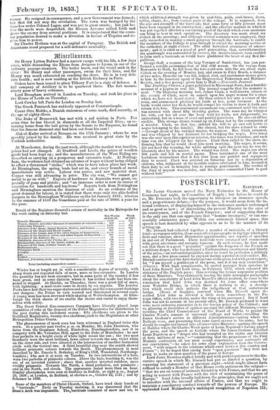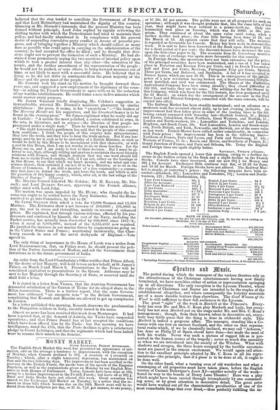POSTSCRIPT.
SATURDAY.
Sir JAMES GusnArir moved the Navy Estimates in the House of Commons last night, in Committee of Supply ; but before he could do so Mr. DISRAELI took the opportunity to interpose an immense speech, and a proportionate debate,—for the purpose, it would seem from the in- ternal evidence, of displaying himself in the statesman market undamaged and as good as new ; of discrediting the present Ministry in the eyes of its countrymen, and of the French Emperor ; and of suggesting that he is the only one that can appreciate that " homme incompris," or can suc- cessfully administer peace. Within our extremely limited space, this speech is best described by what appears to us to be the manner of its getting-up.
Mr. Disraeli had collected together a number of materials, of a literary kind—newspaper articles, those semi-official paragraphs in big type which give facts and rumours about Ministerial appointments, and reports of speeches in and out of Parliament. These materials were arranged and commented with great adroitness and sarcastic humour. By such means, he first made out that there is a great" prejudice" against the Emperor of the French as a military despot, who has destroyed a Parliamentary constitution and liberty of the press,—an unfounded prejudice, since he is not by profession a military man, and a free press cannot be enjoyed during a period of civil conflict. Mr. Disraeli contravened the Anti-Gallican tone of the press, but with great respect; for "I am myself a gentleman of the press, and it is my only escutcheon." (Cheers.) With high compliments, be quoted passages from speeches by Lord John Russell and Lord Grey, in February 1852, which censured the strictures of the English press ; thus reviving the former unpopular position of those Ministers. Very elaborately tracing the little newspaper paragraphs about the uncertainty of Lord John Russell's official position, he came to the conclusion that Lord John was destined for some once somewhere near Waterloo Bridge in which there is nothing to do ; a descrip- tion which could only indicate the tollgatherer of that unfortunate bridge. [Roars of laughter, renewed when Mr. Disraeli again de- scribed Lord John as allowed a little room somewhere in the Fo- reign Office, with two clerks under the wing of his successor.] But if Lord John was not to remain in 'his present office, Mr. Disraeli professed to want some more enduring guarantee as to the foreign policy of the Cabinet ; and so, glancing at diversities of opinion amongst the different Miniaters,—com- mending the Chief Commissioner of the Board of Works to ponder Sir Charles Wood's censure of universal suffrage and ballot—recalling Sir James Graham's service in different Administrations—asking where the Radicals were, and presuming that none dared answer to his name, lest he should be caught and turned into a Conservative Minister—quoting the speech at Halifax where Sir Charles Wood spoke of Louis Napoleon's having gagged the press, and the speech at Carlisle where Sir James Graham described Louis Napoleon as a " despot who had trampled on the rights and liberties of forty millions of men,"—" considering that the programme of the First Minister contradicts all our most recent experiences, and confounds all our convictions,"—he asked for some clear explanation from the Govern- ment, "with respect to the relations which exist between this country and France" ; for he hoped that among their "open questions" they were not going to make an open question of the peace of Europe. Lord Jonas RUSSELL replied briefly and with perfect quietness to the dis- cursive speech in which Mr. Disraeli had put so limited a question by repeating his statement of a previous night—which might almost Lave sufficed to satisfy a Member of that House really anxious on the subject- " that we are on terms of intimate friendship with France, and that we are acting in concert with France with the view of maintaining the peace of Europe." Lord John broadly laid down the principles, that we ought not to interfere with the internal affairs of France, and that wo ought to maintain a conciliatory conduct towards all the powers of Europe. He applauded Lord Malmesbury's undelayed recognition of Napoleon III;
believed that the step tended to conciliate the Government of France, and that Lord Malmesbury had maintained the dignity of this country. Glancing at Mr. Disraeli's innuendo that the present Ministry has been formed without principle, Lord John replied by rapidly reviewing the shifting tactics with which the Protectionists had tried to maintain their policy, and had finally abandoned it. In compliance with the general desire of suspending convulsive party conflict in favour of peaceful pro- gress, and of bringing together a Ministry which should collect as many men as possible who could agree in carrying on the administration of the country, he had accepted the office he filled ; and he thought that divi- sions ought not to prevent the formation of such a Ministry. He had ab- stained from prematurely urging the two questions of internal policy upon which he took a greater interest than any other—the education of the people, and the further amendment of the representation of the people : he would not be pushed, or urge others, to bring forward measures out of time, or not likely to meet with a successful issue. He believed that in doing so he did not differ in sentiments from the great majority of the House and the great mass of the people.
Mr. COBDEN took his stand on the motion he brought forward three years ago, and suggested a new employment of the diplomacy of the coun- try—in asking the French Government to agree with us in the reduction of our warlike establishments. He could frame a note in five minutes which could answer every purpose. Sir Jelarn GRAHAM briefly dismissing Mr. Cobden's suggestion as impracticable, retorted Mr. Disraeli's malicious pleasantry by similar playfulness : the press, it seems, is his "escutcheon "— the leaders of the Morning Herald are his supporters, and his Standard-bearer is to be found in the evening press." Sir James explained what he really did say at Carlisle : "A nation the most polished, a nation celebrated in arms, in the arts, in literature, and in science—the liberties of that people are prostrated under a single man." Then he turned upon his accuser— "The right honourable gentleman has said that the people of this country hate coalitions : I think the people of this country hate misquotations; they love the truth, and they love to hear the truth spoken. But if any lan- guage used by me is such as to be unworthy of a British Minister, or such as would be held by this House to be inconsistent with that character, or with a seat in this House, then I am not worthy to sit on these benches. Let the House say so, and I am ready to bow to their decision. But I must be al- lowed to say, that, although willing and anxious to maintain the most friendly relations with France, and though desirous that not one word should fall from me to excite French enmity, still, if I am not, either on the hustings or
in this House, to say that which my heart dictates, and my mind and con- science dictate, then certainly I am not fit to be a Minister, or to sit in the
House of Commons. I am still a member of a free community—a commu- nity- that dares to defend the truth, and loves the truth, and which is still the guardian of this happy country, which, after all, is the last refuge of the liberties of Europe." (Cheers.) Mr. MILNER GIBSON followed Mr. Cobden ; Mr. H. 13A111.1E, Mr. Dis- raeli ; and Lord DUDLEY &Tem; approving of the French alliance, rather sided with Lord John.
The motion was again impeded by Mr. HUME ; who thought the In- come-tax ought to be settled before the Navy Estimates. But the House resolved to go into Committee by 164 to 28.
Sir JAMES GRAHAM then asked a vote for 45,000 Seamen and 12,500 Marines. The Estimates show a net increase of 399,0001.; 191,000/. in
pay, the rest in stores and victualling, mainly on account of enhanced prices. He explained, that through various reforms, effected by his pre- decessors and continued by himself, the cost of the Navy, including the Packet service has actually been diminished by 950,000/. since 1847-'8; when it stood at 8,060,0001., instead of the 6,235,493/. now required. He justified the increase in our marine forces by augmentations going on in the United States and France; mentioning incidentally, that Cher- bourg exceeds in area all the naval dockyards of England.—Vote agreed to.
The only thing of importance in the House of Lords was a notice from Lord ELLENBOROUGH, that, on Friday next, he should present the peti- tion of the Native Association of Madras, and ask the Government their intentions as to the future government of India.



























 Previous page
Previous page